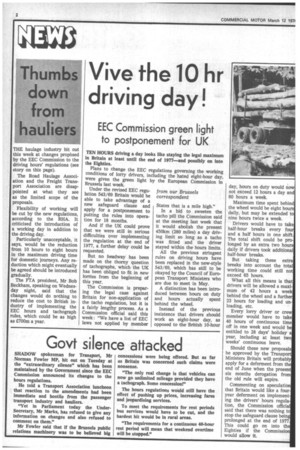Vive the 10 hr driving day!
Page 4

If you've noticed an error in this article please click here to report it so we can fix it.
EEC Commission green light to postponement for UK
TEN HOURS driving a day looks like staying the legal maximum in Britain at least until the end of 1977—and possibly on into the Eighties.
Plans to change the EEC regulations governing the working conditions of lorry drivers, including the hated eight-hour day, were given the green light by the European Commission in Brussels last week. THE haulage industry hit out this week at changes proposed by the EEC Commission to the driving hours' regulations (see story on this page).
The Road Haulage Association and the Freight Transport Association are disappointed at what they see as the limited scope of the proposals.
Flexibility of working will be cut by the new regulations, according to the RHA. It criticised the introduction of a working day in addition to the driving day.
Particularly unacceptable, it says, would be the reduction from 10 hours to eight hours in the maximum driving time for domestic journeys. Any reduction which might eventually be agreed should be introduced gradually.
The FTA president, Mr Bob Beckham, speaking on Wednesday night, said that the changes would do nothing to reduce the cost to British industry of implementing the EEC hours and tachograph rules, which could be as high as £700m a year. Under the revised EEC regulation 543/69 Britain would be able to take advantage of a new safeguard clause and apply for a postponement to putting the rules into operation for 18 months.
And if the UK could prove that we were still in serious difficulties over implementing the regulation at the end of 1977, a further delay could be requested.
But no headway has been made on the thorny question of tachographs, which the UK has been obliged to fit in new lorries from the beginning of this year.
The Commission is preparing the legal case against Britain for non-application of the tacho regulation, but it is a fairly lengthy process. As a Commission official said this week : "We have a list of EEC laws not applied by member from our Brussels correspondent States that is a mile high."
In a bid to sweeten the tacho pill the Commission said at the meeting last week that it would abolish the present 450km (280 miles) a day driving limit so long as a tacho was fitted and the driver stayed within the hours limits.
All the previous stringent rules on driving hours have been replaced in the new-style 543/69, which has still to be okayed by the Council of European Transport Ministers who are due to meet in May.
A distinction has been introduced between hours on duty and hours actually spent behind the wheel.
Instead of the previous insistence that drivers should work an eight-hour day, as opposed to the British 10-hour day, hours on duty would now not exceed 12 hours a day and 60 hours a week.
Maximum time spent behind the wheel would be eight hours daily, but may be extended to nine hours twice a week.
Drivers would have to take half-hour breaks every f and a half hours in one shift. The total shift could be prolonged by an extra two hours daily if drivers took additional half-hour breaks.
But taking these extra breaks into account the total working time could still not exceed 65 hours, What all this means is that drivers will be allowed a maximum of 42 hours a week behind the wheel and a further 23 hours for loading and unloading, etc.
Every lorry driver or crew member would have to take 40 hours of continuous time off in one week and would be entitled to 28 days' holiday a year, including at least two weeks' continuous leave.
Should these new proposals be approved by the Transpor Ministers Britain will probabl apply for a deferment from th end of June when the presen six months derogation from the old rule will expire.
Commenting on speculation that Britain would like a fouryear deferment on implementing the drivers' hours regulation, the Commission officia said that there was nothing to stop the safeguard clause bein prolonged at the end of 1977 This could go on into th Eighties if the Commissio would allow it.
















































































































